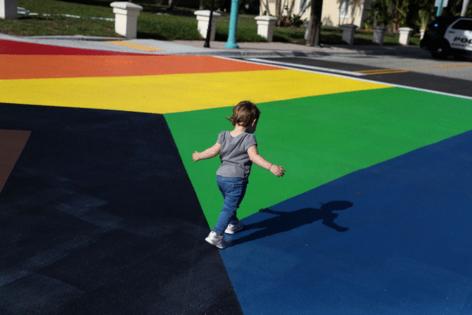West Palm Beach removing LGBTQ+ rainbow crosswalk under orders from Trump, DeSantis administrations
Published in News & Features
West Palm Beach is eliminating its rainbow crosswalk, which was created to support the city’s LGBTQ+ community. The decision isn’t voluntary, and the city plans a nearby demonstration of support for LGBTQ+ residents and visitors.
The city’s decision is a result of directives from the administrations of President Donald Trump and Gov. Ron DeSantis to get rid of the street markings that commemorate the LGBTQ+ community.
“To comply with updated FDOT regulations, the city will soon power wash the rainbow crosswalk at Spruce Avenue and Northwood Road; however, our strength and resolve to do what is right remain unwavering,” Kathleen Joy, director of communications in West Palm Beach Mayor Keith James’ office said via email, referring to the Florida Department of Transportation.
“As part of our continued commitment to meaningfully honor and celebrate the LGBTQ+ community, the monument will be relocated and reimagined at Serenity Park in Northwood Village,” Joy said. Bricks in the colors of the LGBTQ+ flag “will serve as the centerpiece of a beautifully redesigned space, featuring enhanced landscaping, improved lighting, and other welcoming elements — creating a safe, vibrant, and enduring tribute to the community.”
The crosswalks are a couple of blocks away from Serenity Park in Northwood Village, a part of the city that was revitalized years ago largely by LGBTQ+ residents, said Rand Hoch, president of the Palm Beach County Human Rights Council, who lives in West Palm Beach.
On Wednesday Boynton Beach became the first South Florida city with LGBTQ+ rainbow street markings to eliminate them.
The actions were a response to edicts from Trump’s transportation secretary, Sean Duffy, who wrote in a July 1 social media post that “Taxpayers expect their dollars to fund safe streets, not rainbow crosswalks,” and DeSantis’ transportation secretary, Jared Perdue, who wrote a day later that Florida wants to “keep our transportation facilities free & clear of political ideologies.”
The transportation policies come at a time of a rapidly shifting political environment surrounding the LGBTQ+ community and related issues. Efforts that support diversity, equity and inclusion have been disbanded by federal and state governments.
Perdue attached a memo to his social media post that threatened to withhold state money from noncompliant cities.
Defying that would be costly. In its most recent fiscal year, Joy said, the city spent about $7.6 million on road and transportation projects. About $5.3 million came from the city, $1.3 million from the state, and $1 million from federal sources.
Hoch, who stood next to James when the mayor cut the ribbon for the new crosswalks at the beginning of LGBTQ+ Pride Month in 2021, decried the orders to eliminate it and others.
“There’s no reason to have cities have to paint over these or rip them up because the bigots in Washington, D,.C., and Tallahassee have nothing better to do than blackmail and threaten public officials about being welcoming to everyone,” Hoch said in an interview.
He also said local officials shouldn’t be faulted for removing the rainbow street markings under orders from the state and federal governments.
Hoch, who originated the idea of rainbow crosswalks in West Palm Beach years ago when he was a member of the city’s Art In Public Places Committee, said in a statement that he reached out to Sybille Canthal, director of art, culture and community building for the city of West Palm Beach once it became apparent the crosswalk couldn’t remain in place.
“When confronted with directives to erase memorials recognizing the LGBTQ+ community, public officials across Florida struggled to find appropriate solutions,” Hoch said, praising James, Canthal and the city’s Community Redevelopment Agency for “swiftly” coming up with the park solution.
The initial cost of the crosswalks was $9,500, paid for by the city’s CRA and its ArtLife program. Money from ArtLife and a private sponsorship have paid for refreshing the crosswalks since they were installed, Joy said.
Hoch said the city had already bought colored bricks, that wouldn’t fade, to refurbish the intersection and the CRA had allocated money to refurbish Serenity Park. He said the city’s plan was a good solution.
-----------
©2025 South Florida Sun Sentinel. Visit at sun-sentinel.com. Distributed by Tribune Content Agency, LLC.







Comments